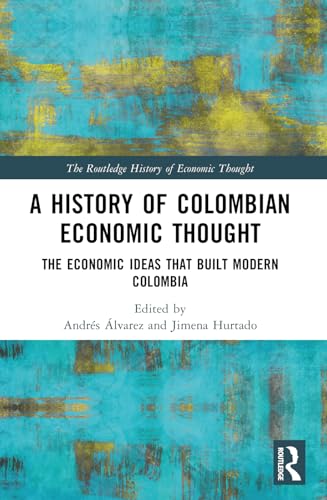
A History of Colombian Economic Thought
Andres Alvarez, Jimena Hurtado
Questions & Answers
The interplay between economic theory and policy has significantly shaped Colombia's economic development. In the 19th century, debates on protectionism and free trade, influenced by utilitarianism and Catholic social thought, shaped economic policies. The 20th century saw the rise of economic experts and the internationalization of economics, with philanthropic foundations like Rockefeller and Ford supporting economic education. Economic missions, like those from the World Bank and CEPAL, influenced policy, particularly in the area of informality. The failed CEPALino connection and the eventual adoption of the Washington Consensus marked a shift towards economic liberalism. This evolution reflects the country's efforts to balance market forces with social concerns, leading to a more stable but unequal economy.
Various economic schools of thought have significantly influenced Colombia's economic policies and outcomes.
Liberalism, with its emphasis on free markets and minimal government intervention, was foundational in shaping Colombia's economic policies, especially in the 19th century. It influenced the adoption of free trade policies and the development of a market-oriented economy. However, protectionism also played a role, particularly in the late 19th and early 20th centuries, with the Regeneración government implementing protectionist measures to support domestic industries.
Keynesianism emerged in the mid-20th century, advocating for government intervention to manage the economy. This influenced policies like public investment and macroeconomic stabilization, contributing to Colombia's macroeconomic stability. The country's economic policies have been shaped by a blend of these schools, reflecting the country's unique economic and political context.
The political and social contexts of Colombia have significantly influenced the adoption and implementation of economic policies. The country's history of political debates and its diverse economic thought have shaped its economic policies. During the 19th century, the clash between liberals and conservatives, often centered around the role of the state and the market, led to alternating periods of free trade and protectionism. The Regeneración period, marked by conservative dominance, saw the implementation of protectionist policies to foster national industry. In the 20th century, the state's demand for economic knowledge led to the professionalization of economics, with international experts shaping policy. The 1960s saw the emergence of academic economics, influenced by international trends and philanthropic foundations. Heterodox economic theories, including Marxism and structuralism, have also played a role, particularly in understanding economic backwardness and social crises. The country's economic policies have thus been shaped by a combination of political ideologies, international influences, and the specific social and historical context of Colombia.
Colombia's economy faces significant challenges and opportunities amidst globalization and technological advancements. Key challenges include:
- Informality: Informal employment remains a structural issue, affecting productivity and economic growth.
- Debt: High levels of public debt and vulnerability to global financial crises.
- Inequality: Persistent income inequality and regional disparities.
- Environmental Concerns: The need to balance economic growth with environmental sustainability.
Opportunities include:
- Trade: Access to global markets and potential for diversification.
- Technology: Adoption of technology to improve productivity and efficiency.
- Investment: Attracting foreign investment in sectors like energy and infrastructure.
- Education: Developing a skilled workforce to compete in the global economy.
The role of education and intellectual discourse has significantly contributed to the evolution of economic thought in Colombia. Initially, the introduction of political economy in higher education during the 19th century shaped the nation's economic narrative, with debates on protectionism and free trade reflecting broader political and social tensions. The 20th century saw the professionalization of economics, with philanthropic foundations like Rockefeller and Ford supporting academic programs, fostering internationalization and modernization. Economic historians like Luis Eduardo Nieto Arteta and Luis Ospina Vásquez applied historical materialism and conservative perspectives, respectively, to analyze economic development. The rise of alternative economic theories, including Marxism and CEPAL structuralism, influenced policy discussions. The inclusion of women in economic decision-making positions and the ongoing debate on gender biases in economics also reflect the evolving nature of economic thought in Colombia.